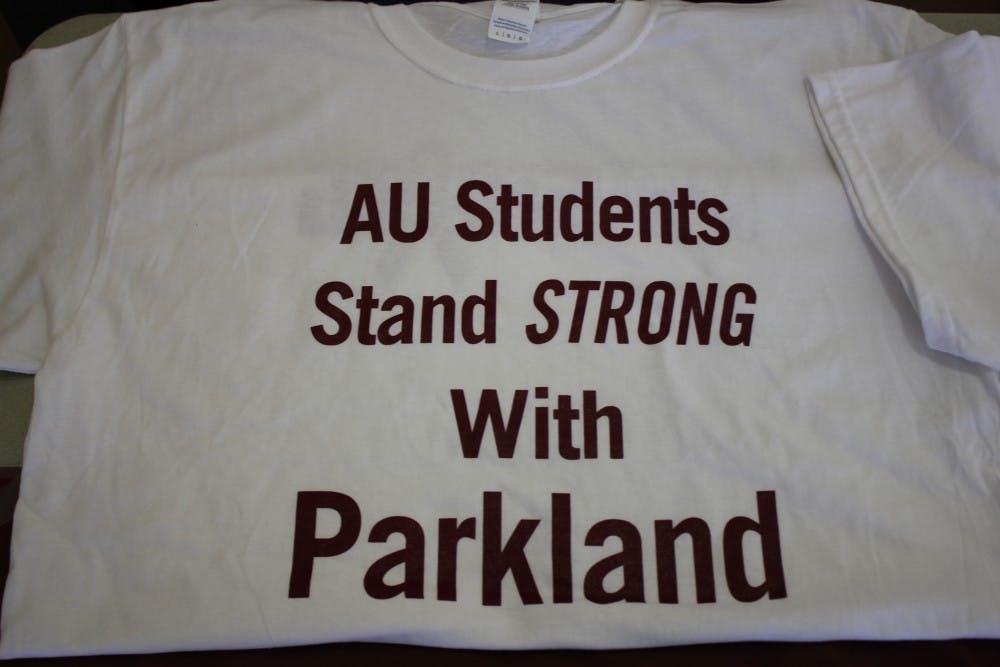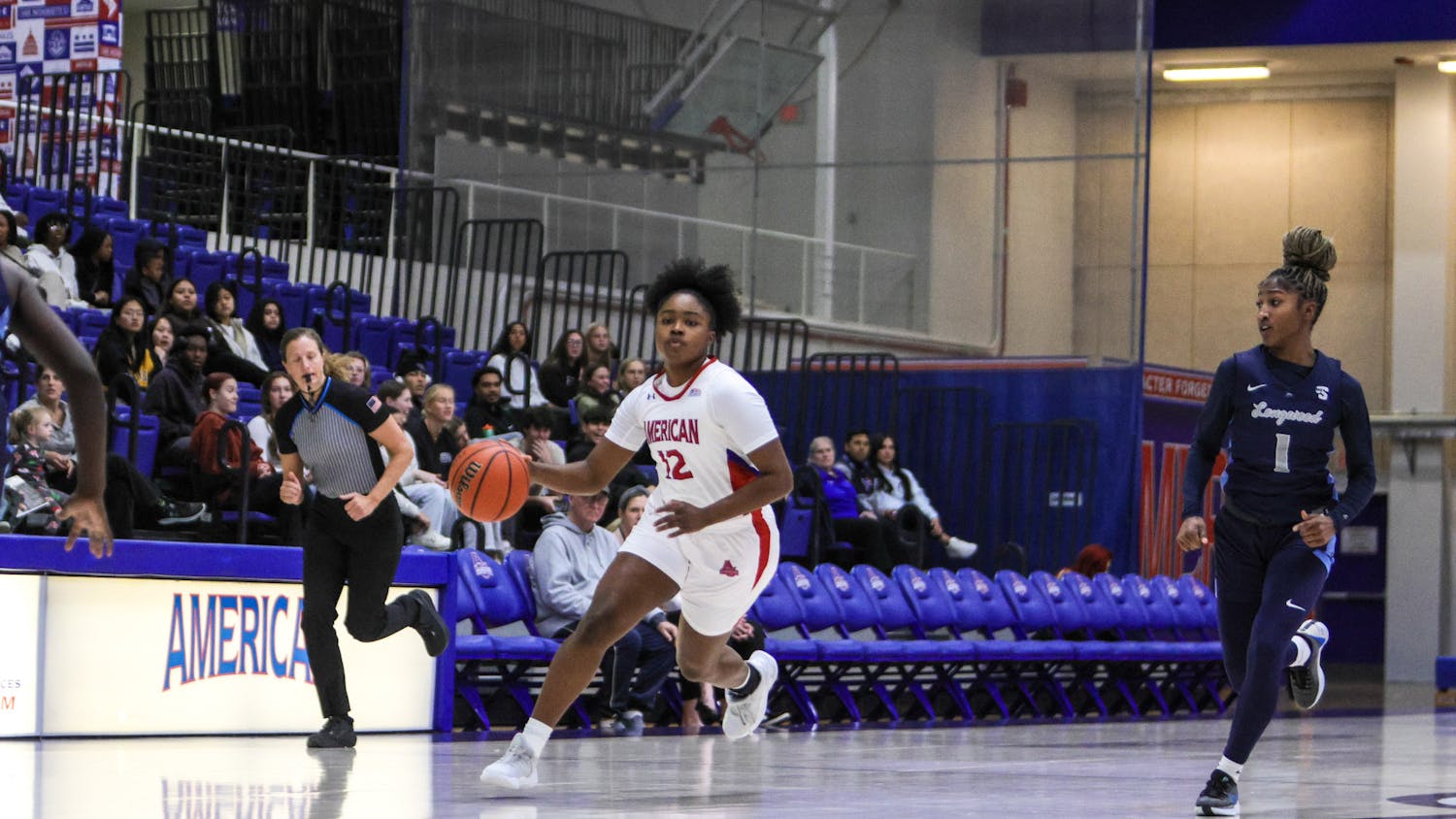Aaron Torop, an AU senior, was out to dinner with his girlfriend on Feb. 14 when the texts started to come in: there had been a shooting in Parkland, Florida. He might know one of the victims.
“I remember sitting at dinner and I got a string of texts that was, ‘She was shot, she’s fine, she’s dead, no she’s in surgery, no she’s fine,’ all within like ten minutes of each other,” Torop said. “It was really hard to figure out what to believe or not believe.”
Eventually, Torop and other counselors from URJ Camp Coleman, a Jewish sleepaway camp in Cleveland, Georgia, received the horrible news: one of their campers, Alyssa Alhadeff, had been killed in a mass shooting at Marjory Stoneman Douglas High School. She was 14-years-old.
Torop is one of several AU students touched by the Parkland shooting, which left 17 people dead and 17 others wounded. As people from across the country descend on Washington for the March for Our Lives this Saturday, The Eagle spoke to students, an alumna and an incoming freshman about how the shooting at Stoneman Douglas has changed their lives and spurred them to take action against gun violence.
Students with connection to Parkland take action
In the immediate aftermath of the shooting, junior Eden Skopp, who graduated from Stoneman Douglas in 2015, was not sure how to move forward. She wanted to help the school and the students she still knew there, but wondered, “What can I do from so far away?”
“Something horrible happened to them and no one can understand how they feel, and that was really hard for me because I felt like … what can I do now?” Skopp said. “I started doing things, and I felt like it wasn’t enough. But in reality, anything to spread awareness, to raise money, to lobby, is something.”
Skopp, alongside fellow Stoneman Douglas alumna Erica Steinman and junior Sarah Selcer, organized a Bake Action Against Gun Violence event in early March inspired by the children of Rep. Ted Deutch (D-FL), who represents the Parkland area in Congress. Skopp also became involved with a newly formed Stoneman Douglas alumni group in D.C., which organized a fundraiser in Georgetown attended by Deutch and D.C. Mayor Muriel Bowser.
“The alumni network came together so quickly,” Skopp said. “Everyone wants to help each other, and that’s the most comforting thing.”
Selcer, who grew up in Parkland, sold T-shirts this week bearing the words “AU Students Stand Strong With Parkland” to raise money for the family of Anthony Borges, the last victim of the shooting still hospitalized in critical condition. She hopes to gather more donations and reach her goal of $1,000.
“I was just at home in Parkland for spring break, and I decided that I needed to do something more here because I felt that AU wasn’t really doing enough,” Selcer said. “I didn’t want people to forget about him or his family, [who are] still really suffering.”
For Parkland native Julia Flum, a freshman, visiting home over spring break made her realize the full impact of the tragedy.
“You walk everywhere, and it’s ‘MSD Strong,’” Flum said. “Outside Publix, they were selling March for Our Lives shirts. It’s just very depressing, and I’m just happy that everyone’s strong and they’re doing something about it rather than just posting on social media.”
The shooting has reshaped Flum’s sense of safety on campus and in D.C. She no longer takes the Metro because she feels it is unsafe. For days after the shooting, Flum said she sought counseling and missed classes because she was too nervous to be in the classroom.
“I’m in class now and I’ll hear a noise and I think the worst,” Flum said. “If there’s a shooting at Parkland, there could be a shooting here. There could be a shooting anywhere.”
Torop, the senior and camp counselor, has also seen his life transformed by the events at Stoneman Douglas. After taking the first weeks following the shooting to grieve, Torop has thrown himself into activism. Last week, he helped organize the Congressional Solidarity Walk Out on Capitol Hill that featured about 50 members of Congress and 3,000 students in the D.C. metro area.
He has been involved with activism and political organizing in the past. But this time, Torop said, is different. It’s personal.
“It was sometimes easy to just try to turn off the personal side and treat this as another issue that I’m interested in academically as a political science major,” Torop said by phone. “But it definitely is more than that, and I think I found meaning in it by doing work with people who also recognize that.”
Outside of organizing the Union for Reform Judaism’s presence at the march on Saturday, Torop remains committed to checking in on former campers who survived the shooting.
“A day doesn’t go by that I don’t think of my other campers that were in the school and lived, and what this means for them, not only as an issue of gun violence prevention, but also are they eating three meals a day? Are they sleeping at night?” Torop said. “Sometimes it’s yes, and sometimes it’s no. Thinking about them is definitely a large part of my new reality.”
‘It’s a new normal,’ says incoming freshman from Parkland
One of the students directly impacted by the shooting is Noah Damiani, a Stoneman Douglas senior who will attend AU in the fall. Damiani left the school about 30 minutes before the first shots were fired and heard about the shooting from his sister, a sophomore, who was still inside the school.
“I was just in disbelief,” Damiani said by phone. “It was just a huge mixture of emotions. I didn’t know how to channel that energy. Fortunately, about a week down the road, I was able to realize that I can channel this anger and these emotions into creating change.”
Margie Gitten, who graduated from AU in 1981, works as a college counselor at a high school in Broward County, Florida, where Stoneman Douglas is located. The morning after the shooting, Gitten saw the suffering of her students firsthand.
“A lot of kids came in -- particularly ninth graders -- very, very upset,” Gitten said in a phone interview. “I was so upset because I had seen so many kids come in and they were really suffering, either that they knew kids that were killed or they were putting themselves in that situation.”
In the weeks since the shooting, the atmosphere at Stoneman Douglas has been tense, Damiani said. Damiani, who is in D.C. this weekend to visit legislators on Capitol Hill and attend the march with his classmates, said the “insane” amount of security at Stoneman Douglas has created a “new normal.”
“It doesn’t feel like the same place that we used to go to,” Damiani said. “I’m glad that I’m going away to college. I don’t really see how I could stay here another couple of years … I got so used to it beforehand and then I have to get used to a completely new lifestyle.”
Students are hopeful for the movement for gun reform
Though past calls for increased gun control legislation have faltered in the face of Congressional opposition, Skopp said she is “really optimistic” about the potential for Parkland survivors to bring about change in the gun debate.
“I really believe in my school and I really believe in my town because I know what kind of people it produces,” Skopp said. “They are pitbulls and once they grab onto something, they don’t let go.”
Parkland’s “powerful community” and connections have given activists the resources they need to build a strong movement, Selcer said.
“It happened in a high school that is an A-plus high school, has a lot of resources, that has taught these kids how to self-advocate,” Selcer said. “I really think that these kids are going to be the kids that change our future.”
From talking to activists and members of Congress, Torop said there is a sense that the movement has more organization and power behind it and “behind it earlier.”
“I think that the way we’ll know [if it this is different] is how this continues,” Torop said. “Will we continue to register voters? Will this issue continue to play a role in the midterm elections? Will we be able to continue to harness that power?”
Andrew Laureti, a freshman who helped organize housing for at least 15 prospective AU students coming to D.C. for the march, said he hopes students at the University and other colleges across the country will continue to call for gun safety measures “until it works.”
“Students will be enraged to the point where they will want to get out and picket as frequently as possible,” Laureti said. “I don’t think it’s going to end anytime soon.”
As an AU student, Damiani said he will continue to participate in protests against gun violence. He is also thinking about starting a club focused on the issue.
“This isn’t something I want to leave behind in high school and forget about,” Damiani said. “Just because I’m leaving the town, I’m leaving the state, doesn’t mean that I’m leaving behind the threat of it happening again.”





